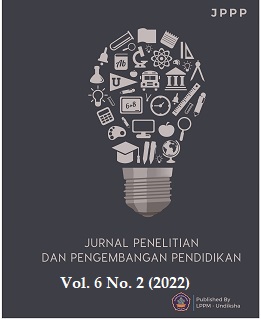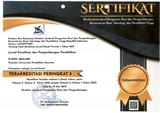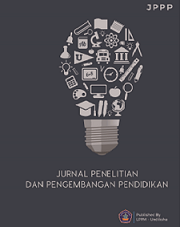Can Think Pair Share Assisted by Mind Mapping Affect Students’ Cognitive Learning Outcomes?
DOI:
https://doi.org/10.23887/jppp.v6i2.49362Keywords:
Cooperative Learning Model, TPS, Mind Mapping, Cognitive Learning Outcomes, Social SciencesAbstract
In the era of globalization, the emergence of learning problems is something that is difficult to avoid, not least in studying the content of social studies lessons. The TPS type cooperative model will be able to maximize student activity in the learning that is carried out. This study aims to analyze the effect of the TPS type cooperative learning model with the help of mind mapping on the acquisition of cognitive learning outcomes for elementary social studies. This research uses a quantitative approach. The research design used a pre-experimental and one group pretest-posttest design. The subjects of this study were 15th grade students who were selected using purposive sampling technique. Research subjects will be given a pretest and posttest. The data from the pretest and posttest were then tested for normality as a prerequisite test for hypothesis testing. In the pretest results, it was found that the average number of students was 53.33 and the posttest increased by 85.77. In the normality test, the significance value of the pretest was 0.179 and the posttest was 0.246, both of which were worth more than 0.05, meaning that the data were normally distributed. Based on the analysis of the hypothesis through the paired sample t-test, a significance value (2-tailed) of 0.000 was obtained, which was less than 0.05. It was concluded that the implementation of the TPS type cooperative learning model with the aid of mind mapping significantly affected the cognitive learning outcomes of elementary social studies.
References
Agustin, N. K. T. J., Margunayasa, I. G., & Kusmariyatni, N. N. (2019). Pengaruh Model Pembelajaran Tps Berbantuan Media Visual Terhadap Hasil Belajar Ipa. Journal for Lesson and Learning Studies, 2(2), 239–249. https://doi.org/10.23887/jlls.v2i2.19148. DOI: https://doi.org/10.23887/jlls.v2i2.19148
Agustina, A. (2021). Peningkatan Prestasi Belajar Siswa pada Pelajaran Bahasa Indonesia Materi Menulis Teks Resensi dengan Menerapkan Model Pembelajaran Kooperatif Tipe Think Pair Share (TPS) di Kelas XI MIPA 1 SMAN 2 Bolo Semester II Tahun Pelajaran 2020/2021. Jurnal Pendidikan dan Pembelajaran Indonesia (JPPI), 1(2), 316–327. https://doi.org/10.53299/jppi.v1i2.93. DOI: https://doi.org/10.53299/jppi.v1i2.93
Ananda, R. (2019). Penerapan Metode Mind Mapping Untuk Meningkatkan Kemampuan Berpikir Kreatif Siswa Sekolah Dasar. Edukatif : Jurnal Ilmu Pendidikan, 1(1), 1–10. https://doi.org/10.31004/edukatif.v1i1.1.
Andari, K. D. W., & Al-Wahid, S. M. (2020). Analisis Hasil Belajar Mahasiswa Melalui Penggunaan Mind Mapping Mata Kuliah Konsep Dasar Ipa Biokimia. Edukasia, 7(1), 51–58. https://doi.org/10.35334/edu.v7i1.1377.
Annisa, R., Subali, B., & Heryanto, W. P. (2018). Peningkatan Daya Ingat dan Hasil Belajar Siswa dengan Mind Mapping Method pada Materi Listrik Dinamis. Jurnal Pendidikan (Teori dan Praktik), 3(1), 19. https://doi.org/10.26740/jp.v3n1.p19-23. DOI: https://doi.org/10.26740/jp.v3n1.p19-23
Ayuningsih, K. (2017). Pengaruh Video Animasi Terhadap Hasil Belajar Kognitif Pada Mata Pelajaran IPS Materi Menghargai Jasa Pahlawan di Kelas V SDN Sidokumpul Sidoarjo. JICTE (Journal of Information and Computer Technology Education), 1(1), 43. https://doi.org/10.21070/jicte.v1i1.1129. DOI: https://doi.org/10.21070/jicte.v1i1.1129
Buran, A., & Filyukov, A. (2015). Mind Mapping Technique in Language Learning. Procedia - Social and Behavioral Sciences, 206. https://doi.org/10.1016/j.sbspro.2015.10.010. DOI: https://doi.org/10.1016/j.sbspro.2015.10.010
Dadi, I. K., Redhana, I. W., & Juniartina, P. P. (2019). Analisis Kebutuhan Untuk Pengembangan Media Pembelajaran Ipa Berbasis Mind Mapping. Jurnal Pendidikan dan Pembelajaran Sains Indonesia (JPPSI), 2(2), 70. https://doi.org/10.23887/jppsi.v2i2.19375. DOI: https://doi.org/10.23887/jppsi.v2i2.19375
Fatmawati, F., Yusrizal, Y., & Hasibuan, Marhamah, A. (2021). Pengembangan Media Pembelajaran Berbasis Aplikasi Android untuk Meningkatkan Hasil Belajar IPS Siswa. Elementary School Journal Pgsd Fip Unimed, 11(2), 134–143. https://doi.org/10.24114/esjpgsd.v11i2.28862. DOI: https://doi.org/10.24114/esjpgsd.v11i2.28862
Hamdah, S., & Umayah. (2018). Pengaruh Model Course Review Horay Terhadap Hasil Belajar IPS Materi Mengenal Perkembangan Teknologi Transportasi. Jurnal Keilmuan dan Kependidikan Dasar, 10(1), 29–42. https://doi.org/10.32678/primary.v10i1.1256.
Handayani, P. (2017). Upaya Peningkatan Keterampilan Sosial Siswa Melalui Permainan Tradisional Congklak Pada Mata Pelajaran IPS. Premiere Educandum : Jurnal Pendidikan Dasar dan Pembelajaran, 7(01), 39. https://doi.org/10.25273/pe.v7i01.1245. DOI: https://doi.org/10.25273/pe.v7i01.1245
Harahap, S. Z. H. (2018). Meningkatkan kemampuan komunikasi matematika siswa melalui model reciprocal teaching. Seminar Nasional Pendidikan Dasar, 274–283.
Harumini, N. L., Sudana, D. N., & Tastra, I. D. K. (2017). Pengaruh Model Pembelajaran Think Pair Share Terhadap Motivasi Belajar dan Hasil Belajar IPS Siswa Kelas V SD di Gugus VII Kecamatan Sukasada Tahun Pelajaran 2016/2017. Mimbar PGSD Undikhsa, 5(2). https://doi.org/10.23887/jjpgsd.v5i2.10637.
Hastuti, N. D., Baedowi, S., & Prasetya, S. A. (2020). Keefektifan Model Pembelajaran Think Pair and Share (TPS) Terhadap Nilai Belajar IPS. Jurnal Pedagogi dan Pembelajaran, 3(1), 112. https://doi.org/10.23887/jp2.v3i1.24401. DOI: https://doi.org/10.23887/jp2.v3i1.24401
Hidayah, R. A., Caturiasari, J., & Mulyani, S. (2021). Penerapan Model Pembelajaran Mind Mapping terhadap Keterampilan Pemahaman Konsep Siswa dalam Pembelajaran IPS. Prosiding Seminar Nasional Pendidikan Dasar PGSD, 1612–1621.
Izati, S. N., Wahyudi, & Sugiyarti, M. (2018). Project Based Learning Berbasis Literasi untuk Meningkatkan Hasil Belajar Tematik. Jurnal Pendidikan: Teori, Penelitian, dan Pengembangan, 3(9), 1122—1127-1127. https://doi.org/10.17977/jptpp.v3i9.11508.
Kay, Y., Benu, A. Y., & Tanggur, F. S. (2021). Pengaruh Model Pembelajaran Mind Mapping Terhadap Minat Belajar Siswa Pada Mata Pelajaran Ilmu Pengetahuan Sosial Pada Kelas V di SD Negeri Oetona Kupang. Jurnal Mahasiswa Pendidikan Dasar, 2(1), 64–72. DOI: https://doi.org/10.26858/pjppsd.v2i1.31042
Kurniasih, D. (2018). Peningkatan Minat Dan Hasil Belajar Ipa Melalui Model Pembelajaran Think Pair Share. Natural: Jurnal Ilmiah Pendidikan IPA, 5(1), 7. https://doi.org/10.30738/natural.v5i1.2539. DOI: https://doi.org/10.30738/natural.v5i1.2539
Lesi, A. N., & Nuraeni, R. (2021). Perbedaan Kemampuan Pemecahan Masalah Matematis dan Self-Confidence Siswa antara Model TPS dan PBL. Jurnal Pendidikan Matematika, 1, 249–262. https://doi.org/10.31980/plusminus.v1i2.1260. DOI: https://doi.org/10.31980/plusminus.v1i2.1260
Mahardika, I. P. M., Dantes, & Widiana. (2018). Pengaruh Model Pembelajaran Numbered Heads Together Terhadap Hasil Belajar IPS Pada Siswa Kelas V SD Gugus V Kintamani Tahun Pelajaran. MIMBAR PGSD Undiksha, 6(1), 1–8. https://doi.org/10.23887/jjpgsd.v6i1.13069.
Masliani, Putra, A. P., & Winarti, A. high school students ’ creative thinking in the ecological learning through mind mapping strategy-a development R. (2019). Senior high school students ’ creative thinking in the ecological learning through mind mapping strategy - a development research. European Journal of Education Studies, 5(12), 80–90. https://doi.org/10.5281/zenodo.2600513.
Merchie, E., & Keer, H. Van. (2016). Mind mapping as a meta-learning strategy: Stimulating pre-adolescents’ text-learning strategies and performance? Contemporary Educational Psychology, 46. https://doi.org/10.1016/j.cedpsych.2016.05.005. DOI: https://doi.org/10.1016/j.cedpsych.2016.05.005
Mihladiz, G., Duran, M., & Doǧan, A. (2011). Examining primary school students’ attitudes towards science in terms of gender, class level and income level. Procedia - Social and Behavioral Sciences, 15, 2582–2588. https://doi.org/10.1016/j.sbspro.2011.04.150. DOI: https://doi.org/10.1016/j.sbspro.2011.04.150
Munasti, K., Hibana, H., & Surahman, S. (2021). Penggunaan Mind Mapping sebagai Media Pengembangan Kreativitas Anak di Masa Pandemi. Aulad: Journal on Early Childhood, 4(3), 179–185. https://doi.org/10.31004/aulad.v4i3.104. DOI: https://doi.org/10.31004/aulad.v4i3.104
Muthoharoh, N. B. (2017). Pengaruh Model Pembelajaran Kooperatif “Think Pair Share” terhadap Hasil Belajar Bahasa Inggris. SAP (Susunan Artikel Pendidikan), 2(1), 33–42. https://doi.org/10.30998/sap.v2i1.1509. DOI: https://doi.org/10.30998/sap.v2i1.1509
Mutia, T., Agustina, S., Suroso, & Akhmad, R. (2020). Pengaruh Pembelajaran Kooperatif Model Think Pair Share (Tps) Terhadap Hasil Belajar Geografi. Geodika: Jurnal Kajian Ilmu dan Pendidikan Geografi, 4(2), 210–219. https://doi.org/10.29408/geodika.v4i2.2869. DOI: https://doi.org/10.29408/geodika.v4i2.2869
Ningsih, A. (2018). Pengaruh Keaktifan Siswa Terhadap Hasil Belajar Ekonomi Kelas X di SMAN 2 Gunung Sahilan. Jurnal Pendidikan Ekonomi Akuntansi FKIP UIR, 6(2), 157–163. DOI: https://doi.org/10.31851/neraca.v2i2.2690
Nugraha, Y. A., Handoyo, E., & Sulistyorini, S. (2018). Traditional Game on The Social Skill of Students in The Social Science Learning of Elementary School. Journal of Primary Education, 7(2), 220–227. https://doi.org/10.15294/jpe.v7i2.23475.
Nureva, & Citra, A. G. (2017). Pengaruh Penggunaan Model Pembelajaran Inkuiri Berbantuan Mind Mapping dan Picture Mapping Terhadap Hasil Belajar IPA Pada Siswa Kelas V Sekolah Dasar. Terampil Jurnal Pendidikan dan Pembelajaran Dasar, 4(2), 157–170.
Permana, Dantes, & Parmiti. (2017). Pengaruh Model Pembelajaran Problem Posing Terhadap Hasil Belajar IPS Siswa Kelas V Pada Gugus IV Kerinci Kecamatan Melaya Tahun Ajaran 2016/2017. MIMBAR PGSD Undiksha, 5(2), 1–10. https://doi.org/10.23887/jjpgsd.v5i2.11029.
Phafiandita, A. N., Permadani, A., Pradani, A. S., & Wahyudi, M. I. (2022). Urgensi Evaluasi Pembelajaran di Kelas. JIRA: Jurnal Inovasi dan Riset Akademik, 3(2), 111–121. https://doi.org/10.47387/jira.v3i2.262. DOI: https://doi.org/10.47387/jira.v3i2.262
Pitriani, N. W., Ardana, I. K., & Kristiantari, M. G. R. (2017). Pengaruh Model Pembelajaran Think Pair Share Berbantuan Audio Visual Terhadap Kompetensi Pengetahuan Ips. Mimbar Pgsd, 5(2), 1–9. https://doi.org/http://dx.doi.org/10.23887/jjpgsd.v5i2.10789.
Prehanto, A., Aprily, N. M., Merliana, A., & Nurhazanah, M. (2021). Video Pembelajaran Interaktif-Animatif sebagai Media Pembelajaran IPS SD Kelas Tinggi di Masa Pandemi Covid 19. Indonesian Journal of Primary Education, 5(1), 32–38. https://doi.org/10.17509/ijpe.v5i1.33696. DOI: https://doi.org/10.17509/ijpe.v5i1.33696
Puspitaningdyah, D. O., & Purwanti, E. (2018). Pengaruh Keterampilan Mengelola Kelas dan Keaktifan Belajar terhadap Hasil Belajar IPS SD. Joyful Learning Journal, 7(1), 39–47. https://doi.org/10.15294/jlj.v7i1.24188.
Putra, I. G. D., & Sujana. (2020). Hasil belajar IPS menggunakan Kolaborasi Model Discovery Learning Berbasis Media Animasi. Journal of Educational Technology, 4, 103–109. https://doi.org/10.23887/jet.v4i2.25099. DOI: https://doi.org/10.23887/jet.v4i2.25099
Qusyairi, L. A. H., & Sakila, J. (2018). Pengaruh Model Cooperative Learning Tipe Inside-Outside Circle (IOC) terhadap Prestasi Belajar dengan Memperhatikan Minat Belajar Matematika. Palapa: Jurnal Studi Keislaman dan Ilmu Pendidikan, 6(1), 34–49. https://doi.org/10.36088/palapa.v6i1.57. DOI: https://doi.org/10.36088/palapa.v6i1.57
Rahmi, A., Rustini, T., & Wahyuningsih, Y. (2021). Menumbuhkan Nilai-Nilai Karakter Siswa SD melalui Pembelajaran IPS di Sekolah Dasar. Edukatif : Jurnal Ilmu Pendidikan, 3(6), 5136–5142. https://doi.org/10.31004/edukatif.v3i6.1640. DOI: https://doi.org/10.31004/edukatif.v3i6.1640
Rando, A. R., & Wali, M. (2018). Implementasi Pendidikan Nilai dalam Pembelajaran IPS di Sekolah Dasar. Jurnal Pendidikan Ekonomi, 3(2), 74–82. https://doi.org/10.21831/jipsindo.v1i1.2877. DOI: https://doi.org/10.21831/jipsindo.v1i1.2877
Riyanto, M., Jamaluddin, U., & Pamungkas, A. S. (2019). Pengembangan Video Pembelajaran Berbasis Aplikasi Video Scribe Pada Mata Pelajaran IPS di Sekolah Dasar. Madrasah, 11(2), 53–63. https://doi.org/10.18860/madrasah.v11i2.6419. DOI: https://doi.org/10.18860/madrasah.v11i2.6419
Setyowati, R., & Fimansyah, W. (2018). Upaya Peningkatan Citra Pembelajaran IPS Bermakna di Indonesia. Jurnal PIPSI (Jurnal Pendidikan IPS Indonesia), 3(1), 14. https://doi.org/10.26737/jpipsi.v3i1.544. DOI: https://doi.org/10.26737/jpipsi.v3i1.544
Soleha, S., Purnomo, A., & Nisa, A. N. S. (2019). Pengaruh Media Pembelajaran Mind Map Terhadap Hasil Belajar Siswa Pada Mata Pelajaran IPS Kelas VII di SMP Negeri 38 Semarang. Jurnal Sosiolium, 1(1), 1–13. https://doi.org/10.15294/sosiolium.v1i1.29898. DOI: https://doi.org/10.15294/sosiolium.v1i1.29898
Surya, Y. F. (2017). Peningkatan Hasil Belajar Siswa Ips Menggunakan Model Inkuiri Sekolah Dasar. Lembaran Ilmu Kependidikan, 46(1), 12–15. https://doi.org/10.15294/lik.v46i1.10155.
Susanti, S. (2016). Metode Mind Mapping Untuk Meningkatkan Hasil Belajar Ips Di Sekolah Dasar. Jurnal Pendidikan Guru Sekolah Dasar, 1(1), 25–37. https://doi.org/10.31004/edukatif.v1i1.1. DOI: https://doi.org/10.31004/edukatif.v1i1.1
Tembang, Y., Sulton, & Suharjo. (2017). Peningkatan Motivasi Dan Hasil Belajar Melalui Model Pembelajaran Think Pair Share Berbantuan Media Gambar Di Sekolah Dasar. Jurnal Pendidikan: Teori Penelitian, dan Pengembangan, 2(6), 812–817. https://doi.org/10.17977/jptpp.v2i6.9402.
Utomo, A. C., Abidin, Z., & Rigianti, H. A. (2020). Strategi Think Pair Share dan Jigsaw: Manakah yang Lebih Efektif untuk Kemampuan Pemecahan Masalah Siswa? Profesi Pendidikan Dasar, 7(2), 121–128. https://doi.org/10.23917/ppd.v7i2.11404. DOI: https://doi.org/10.23917/ppd.v7i2.11404
Widiastuti, E. R., & Suyitno. (2018). Upaya Meningkatkan Minat dan Hasil Belajar Mata Pelajaran Sistem Bahan Bakar Bensin dengan Model Pembelajaran Kooperatif tipe Think Pair Share ( TPS ) Kelas XI TKR SMK. Jurnal Pendidikan Teknik Otomotif Universitas Muhammadiyah Purworejo, 12(01), 24–28. https://doi.org/10.37729/autotech.v7i1.2784.
Wildawati, W., Ananda, A., & Hasan, H. (2018). Improving student’s learning outcomes and student’s activity of social science (IPS) subject by using jigsaw learning model at class VIII B in SMPN 14 sijunjung. Jurnal Aplikasi IPTEK Indonesia, 2(2), 27–36. https://doi.org/10.24036/4.22115. DOI: https://doi.org/10.24036/4.22115
Wulandari, F. A., Mawardi, M., & Wardani, K. W. (2019). Peningkatan Keterampilan Berpikir Kreatif Siswa Kelas 5 Menggunakan Model Mind Mapping. Jurnal Ilmiah Sekolah Dasar, 3(1), 10. https://doi.org/10.23887/jisd.v3i1.17174. DOI: https://doi.org/10.23887/jisd.v3i1.17174
Zulfia Latifah, A., Hidayat, H., Mulyani, H., Siti Fatimah, A., & Sholihat, A. (2020). Penerapan Metode Mind Mapping Untuk Meningkatkan Kreativitas Pada Pembelajaran Pendidikan Kewarganegaraan. Jurnal Pendidikan, 21(1), 38–50. https://doi.org/10.33830/jp.v21i1.546.2020. DOI: https://doi.org/10.33830/jp.v21i1.546.2020
Downloads
Published
How to Cite
Issue
Section
License
Copyright (c) 2022 Adinda Dwi Setia Anggraini, Muhammad Abduh

This work is licensed under a Creative Commons Attribution-ShareAlike 4.0 International License.
Authors who publish with the Jurnal Penelitian dan Pengembangan Pendidikan agree to the following terms:
- Authors retain copyright and grant the journal the right of first publication with the work simultaneously licensed under a Creative Commons Attribution License (CC BY-SA 4.0) that allows others to share the work with an acknowledgment of the work's authorship and initial publication in this journal.
- Authors are able to enter into separate, additional contractual arrangements for the non-exclusive distribution of the journal's published version of the work (e.g., post it to an institutional repository or publish it in a book), with an acknowledgment of its initial publication in this journal.
- Authors are permitted and encouraged to post their work online (e.g., in institutional repositories or on their website) prior to and during the submission process, as it can lead to productive exchanges, as well as earlier and greater citation of published work. (See The Effect of Open Access)








